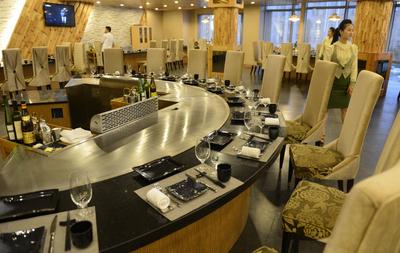Yet North Korea over the past 20 years has experienced a remarkable growth in private markets. The once clear-cut line between state and market is blurred to the point of non-existence.
There are some industries which, for all practical purposes, have been privatised in North Korea for the last two decades. Contrary to popular understanding, Pyongyang has a booming restaurant scene. Most of these fashionable restaurants are actually privately owned. Often a private individual contacts a state agency and suggests that it might be nice to open a restaurant. Officially, such a business is part of the agency in question, but the private investor buys the necessary equipment and furniture, arranges the interior design, and hires the personnel. Employees are paid salaries well in excess of the usual meagre levels — salaries sufficient to make a living.
The government, in exchange for allowing such businesses to operate, expects significant payoffs — the going rate is between 30–70 per cent of net profits. Of course this creates an incentive for creative accounting and the actual share is surely significantly lower. Some of the profit paid to the state is pocketed by state bureaucrats, but much of it seemingly ends up in the state budget itself.
North Koreans themselves appear to be at a loss when it comes to defining these ventures. When asked whether a restaurant is a private or state enterprise, many give a nonsensical answer, calling it ‘a state-owned restaurant with a private investor’. This type of bizarre property relations (essentially private property described as state-owned) is common in North Korea today. For example, many shops are run by private merchants but are registered as state outlets. The owner pays sales clerks, makes sure the shop is stocked, and makes all the managerial decisions. As with restaurants, a significant portion of earnings are supposed to go to the state.
Another area where private capital is common is inter-city transportation, and private capital can even play a role in more advanced areas, such as mining. I personally know a North Korean who used to run a small gold mine. He bought equipment second-hand from state mines not in operation, hired experienced, skilled labour and then restarted an old mine. Ostensibly this was all to be part of a foreign-currency-earning operation directly managed by the Workers’ Party. In practice though, the enterprise was private. The investor/manager, having sent some money to the relevant party agency, as well as some bribes to his supervisors, was free to use the remaining profits as he saw fit.
Generally, foreign-currency-earning operations provide good cover for a fusion of state–private enterprises. Unlike most communist countries, North Korea has never had a centralised foreign trade system, instead allowing government agencies and enterprises to establish their own foreign trade branches. These branches were supposed to sell the goods and products of the organisation they were connected to, but things were rarely so simple. Many of the operations were connected to non-economic units, like a local party branch or army unit. To compensate, these organisations were often given a monopoly on locally produced commodities like mushrooms or squid.
But in order to make sure that the commodities were collected, the relevant agency had to be able to pay producers or gatherers. This is where private investors came into play. They make deals with the foreign-currency-earning branches of relevant agencies and then invest the necessary money to buy the commodity. They also use their connections to arrange for logistics: transportation, storage and sometimes export to China (North Korea’s almost exclusive, sometimes reluctant foreign trading partner). After a fixed amount is paid to their superiors (as a bribe and contribution to the budget) the rest of the profit is reserved for the investor as their income.
North Korea’s system has few precedents in the state socialist world. Such a system is essentially a market economy, but unlike the de facto market economy of 1980s China it is probably unable to generate significant economic growth. It does not help that many of the enterprises described above remain illegal.
Another problem is the lack of infrastructure necessary for stable growth. Even the exchange of basic information is rather complicated in North Korea — in spite of significant progress brought about by the recent and rapid spread of mobile phones. The government itself is afraid of the uncontrolled growth of private entrepreneurialism, and they do what they can to keep these developments at bay.
In sum, North Korean private business is in a peculiar situation. It makes a significant contribution towards the survival (and even the modest growth) of the North Korean economy. But due to government suppression and the absence of property rights, it is unlikely to ever produce the economic breakthrough that North Korea desperately needs.
Andrei Lankov is Professor at Kookmin University, Seoul, and Adjunct Research Fellow at the Australian National University.


Nice article there. Thanks a lot for sharing this information
This article is basically comes from Lankov’s new book, ‘The Real North Korea’. A fascinating book and worth the read.